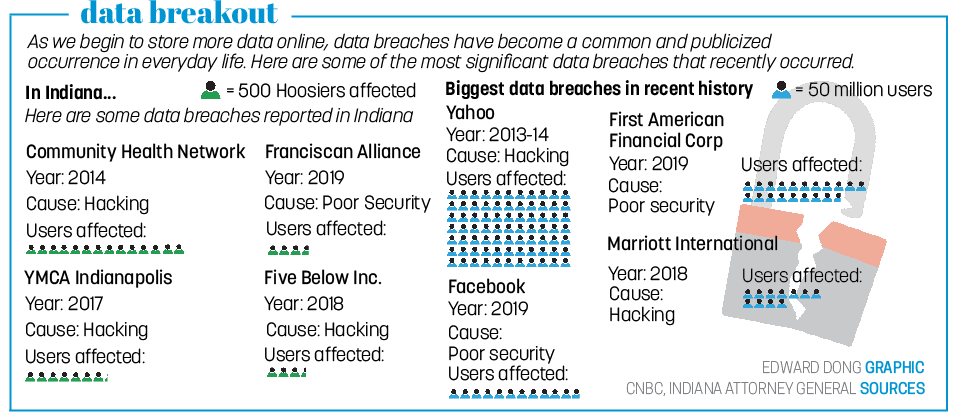On Aug. 16, numerous news media outlets reported a security breach in the Carmel Clay District involving Pearson Clinical Assessment, a former online assessment the district used. The information taken included students’ first and last names and, in some cases, students’ birthdays as well.
The district sent out an email that day to affected students and their families, explaining the situation and offered a complimentary one-year membership to Experian’s IdentityWorksSM. This program provides protection to the user’s identity and help detect any theft that may occur; the email also provided information about signing up. The district also explained that other information, such as grades, were not impacted by this event.
Sophomore Ayaan Abbasi was one of the handful of students who received the email.
“When I got the email, my initial reaction was me being pretty annoyed because it’s my information,” Abbasi said. “But as I thought about it more, mistakes are bound to happen, especially now.”
Abbasi said when his parents first read the email, they too felt annoyed. Abbasi’s mother, Shehzadi Ansari, said via email, “Breaches happen a lot anyway as more and more tech is introduced.”
Junior Katriel “Kat” Lin was another student impacted by the breach. She said that she was initially confused about why she got the email but did not think too much about it at first.
“(It now makes) me wary on how much protection the company is placing on their customers,” Lin said.
Lin also said that despite feeling wary, she acknowledged that the breach was Pearson Clinical Assessment’s fault and not something the school or the district could have prevented from happening.
Unlike Abbasi’s parents, Lin said her parents did not care much about the breach and that the information taken could not do much harm to their daughter.
Sergeant D.J. Schoeff had a similar opinion to Lin’s parents. Although Schoeff explained that this situation was not serious.
“I thought it was good that the school district felt it was important to communicate back out to parents,” Schoeff said.
He continued to explain the difference between saying “there was a security breach” and “there was a security breach but they only got students’ first and last names and some birthdays” and how they influence one’s reaction.
Similar to Lin, Schoeff said, “It wasn’t something that the school district could’ve controlled but I also thought data breaches happen so frequently right now.” He continued with, “It always seems like we hear something about that nature in the news.”
















































































![Review: “The Immortal Soul Salvage Yard:” A criminally underrated poetry collection [MUSE]](https://hilite.org/wp-content/uploads/2025/03/71cju6TvqmL._AC_UF10001000_QL80_.jpg)
![Review: "Dog Man" is Unapologetically Chaotic [MUSE]](https://hilite.org/wp-content/uploads/2025/03/dogman-1200x700.jpg)
![Review: "Ne Zha 2": The WeChat family reunion I didn’t know I needed [MUSE]](https://hilite.org/wp-content/uploads/2025/03/unnamed-4.png)
![Review in Print: Maripaz Villar brings a delightfully unique style to the world of WEBTOON [MUSE]](https://hilite.org/wp-content/uploads/2023/12/maripazcover-1200x960.jpg)
![Review: “The Sword of Kaigen” is a masterpiece [MUSE]](https://hilite.org/wp-content/uploads/2023/11/Screenshot-2023-11-26-201051.png)
![Review: Gateron Oil Kings, great linear switches, okay price [MUSE]](https://hilite.org/wp-content/uploads/2023/11/Screenshot-2023-11-26-200553.png)
![Review: “A Haunting in Venice” is a significant improvement from other Agatha Christie adaptations [MUSE]](https://hilite.org/wp-content/uploads/2023/11/e7ee2938a6d422669771bce6d8088521.jpg)
![Review: A Thanksgiving story from elementary school, still just as interesting [MUSE]](https://hilite.org/wp-content/uploads/2023/11/Screenshot-2023-11-26-195514-987x1200.png)
![Review: "When I Fly Towards You", cute, uplifting youth drama [MUSE]](https://hilite.org/wp-content/uploads/2023/09/When-I-Fly-Towards-You-Chinese-drama.png)
![Postcards from Muse: Hawaii Travel Diary [MUSE]](https://hilite.org/wp-content/uploads/2023/09/My-project-1-1200x1200.jpg)
![Review: "Ladybug & Cat Noir: The Movie," departure from original show [MUSE]](https://hilite.org/wp-content/uploads/2023/09/Ladybug__Cat_Noir_-_The_Movie_poster.jpg)
![Review in Print: "Hidden Love" is the cute, uplifting drama everyone needs [MUSE]](https://hilite.org/wp-content/uploads/2023/09/hiddenlovecover-e1693597208225-1030x1200.png)
![Review in Print: "Heartstopper" is the heartwarming queer romance we all need [MUSE]](https://hilite.org/wp-content/uploads/2023/08/museheartstoppercover-1200x654.png)



